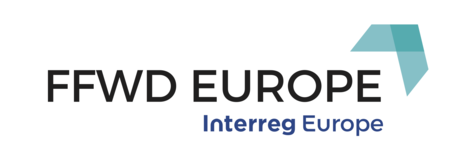On 22nd of March 2018 the FFWD Europe partners met in Turin for the third international learning event at the Bioindustry Park, one of the seven innovation poles of the Piedmont Region.
The event is related to the focus of the third and fourth period of the project: the internationalization as key element for acceleration.
The main purpose of the meeting was to discuss about internationalization issues and acceleration of SMEs in different European territories. On 23rd the partners had had a study visit day at TAG Talent Garden and Polytechnic of Turin Innovative Business Incubator i3p.
22nd March activities
The participants were welcomed by Alberta Pasquero, the CEO of Bioindustry Park, and Dimitri de Vita, councillor of Metropolitan City of Turin.
The first working session was dedicated to the partner’s short presentations on ‘’internationalization of SMEs’’ in their own region/country. The order of the presentations was as follows:
- Normandy Development Agency: Accélérateur Xport
- Nbank: SME internationalisation Exchange (SIE)
-Business Development Centre North Denmark: Organisation of the Aalborg meeting
-CEEIM: Region of Murcia economic panorama
-Metropolitan City of Turin: The Mentoring program
-Kaunas STP: Internationalization of SMEs
-Ifka: Sme internationalisation
-Podlaska Regional Development Foundation: Internationalisation support system in Poldaskie
Afterwards Fabrizio Conicella, General Manager of Bioindustry Park, moderated an interview to two successful entrepreneurs that accelerated their own companies in the Turin’s territory.
The speakers were Silvio Traversa, Chief Scientific Officer Sienna Biopharmaceuticals, and Alessandro Sappia, President and A.D Biotechware. From the dialogue with the attendees emerged the following considerations:
- Internationalization is an essential step for a company that wants to accelerate
- Easy access to private finance is a key factor for company growth
The morning finished with the Round Table in which participated:
- Dimitri De Vita, Metropolitan City of Turin Councillor
- Susanna Barreca, Piedmont Region
- Silvia Bruschieri, Ministry of economic development- Piedmont
- Fabrizio Conicella, Manager of Bioindustry Park
- Cristina Ghiringhello, Confindustria Canavese Director
- Giuseppe Serrao, University of Turin Incubator
The thematic was internationalization to acceleration: tools and instruments for European SMEs. In particular Susanna Barreca talked about some measures adopted by Regione Piemonte to boost the development of innovative startups and their acceleration. The two measures she used as examples were:
- Regional initiatives with aim to support startups through marketing advice in order to facilitate the placement of their outputs.
- The promotion of the Mentoring Program, a Chamber of Commerce measure to boost internationalization of companies.
Barreca concluded adding also that the Region is trying to improve the link between private banks and innovative companies in order to make easier the access to private founding.
After lunch took place a slot in which all the public stakeholders (Piedmont Region, CEIP and Chamber of Commerce) dealing with internationalisation issue explained the framework.
The first day concluded with a stakeholder meeting in parallel with the Steering Committee. During the meeting the participants were divided in two different groups: on of them focused on policies and the second one on economics and business aspects. At the end the two groups discussed together about the results of the meeting.
Main output of the two stakeholders meeting:
1) International talent retainment is one of the most common issues, most of the participants also declare that there is a lack of “startup culture” for the SMEs, along with a poor business model innovation.
2) What is really needed is a more tailored support for the enterprises who try to internationalise.
3) Cooperation between financial system and start-ups system is one of the main issues in the internationalization and acceleration process, this is a common feature in all the regions. It is not easy to attract investors from other states.
4) One of the weaknesses that could be tackled together at interregional/European level is the ecosystem design
The second day was dedicated to two study visits. The first one has been held at the Turin Talent Garden (www.talentgarden.org) a platform where people working on digital, technology and creativity can share common spaces and tools.
The second visit was held at the Polytechnic of Turin Innovative Business Incubator i3p (www.i3p.it). Mario Vittone, a consultant of the Polytechnic incubator illustrated the main objectives and activities carried out by the body.

